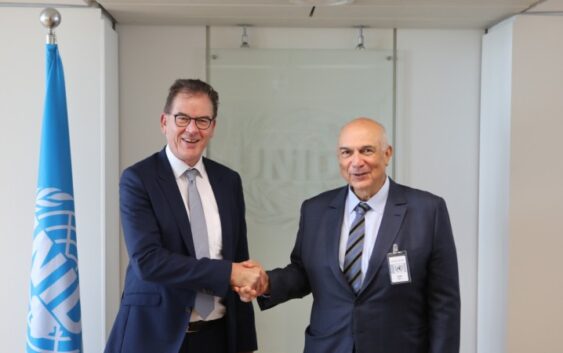- SCZONE SIGNED DEAL WITH CHINESE INVESTORS FOR IRON PRODUCTS PROJECTS IN EGYPT
- WESTPROP HOLDING LIMITED SET TO EMBARKED ON PIPELINE PROJECT IN ZIMBABWE
- FORMER TOGO PLAYER ADEBAYOR LAUNCH SOCIAL HOUSING PROJECT IN TOGO
- AMANSIE WEST DISTRICT ROAD PROJECT BEGINS IN GHANA
- LAGOS TO CALABAR HIGWAY PROJECT: WHY IT CANT BE ACHIEVED
UNIDO AND OCP TO PARTNER FOR GREEN HYDROGEN BUILDING CAPACITY IN MOROCCO

UNIDO and OCP Group, a global leader in phosphate-related industries, have reiterated interest in strengthening and expanding cooperation to produce green hydrogen and ammonia while focusing on capacity-building in Morocco and other African countries.
The Director-General of the United Nations Industrial Development Organizations (UNIDO) Gerd Muller and CEO of OCP Group Mostafa Terrab discussed today OCP Group’s sustainable industrial development approach. They called for expanding partnerships in the fields of sustainable agriculture, agribusiness, training, research, and development as well as technology transfer.
On a recent mission to Morocco, Muller paid a visit to the OCP Group’s Jorf Lasfar plant, the world’s largest fertilizer plant, and to the OCP Foundation which works on training hundreds of youth on “heavy-duty equipment” from Morocco, Cote d’Ivoire, and Senegal.
The production of green hydrogen and green ammonia was a particular focus in the meeting amid increasing global interest in the development of green hydrogen and ammonia technology to make it affordable in the long term. The global scramble for the two substances highlights efforts by governments and other stakeholders in the global economy to shift away from fossil-based energy and ammonia which is heavily used in producing fertilizers.
The war in Ukraine has created a sense of urgency in accelerating the green transition agenda in efforts from European countries to reduce and even cut their reliance on Russian natural gas.
This global trend also coincides with a call for south-south or triangular cooperation to support sustainable development across the Global South in the face of regional and international rises in food insecurity, rising energy prices, climate change, and political instability.
In such a context, the Moroccan fertilizer giant OCP Group has pushed for a modern, climate-resilient African agriculture. It has notably benefitted from record-breaking revenues in the first months of 2022.
With established offices across the continent, OCP Group has supported African countries in developing their fertilizer production as well as training African youth in sustainable agricultural practices.
With Morocco holding limited gas reserves, OCP turned to African natural gas producers such as Nigeria to cut its production costs. Last year, Morocco and Nigeria concluded a $1.3 billion deal for building in the West African country a “regional and global fertilizer powerhouse” that will produce ammonia and other fertilizers using Nigerian gas.
The plant is part of the largest African south-south cooperation framework that includes the Morocco-Nigeria gas pipeline.
Morocco and OCP are currently in need of natural gas to produce ammonia amid rising demand for Moroccan fertilizer due to the global market due to the war in Ukraine.
Yet in the long term, Morocco has the potential to produce lower-cost green hydrogen and thus green ammonia.
Although Morocco’s renewable energy assets provide the country with a competitive advantage in the race for green hydrogen, water scarcity and the high cost of electrolysis technology, used to split water into oxygen and hydrogen, represent a burden to Moroccan ambitions.
SOURCE: MoroccoNews

